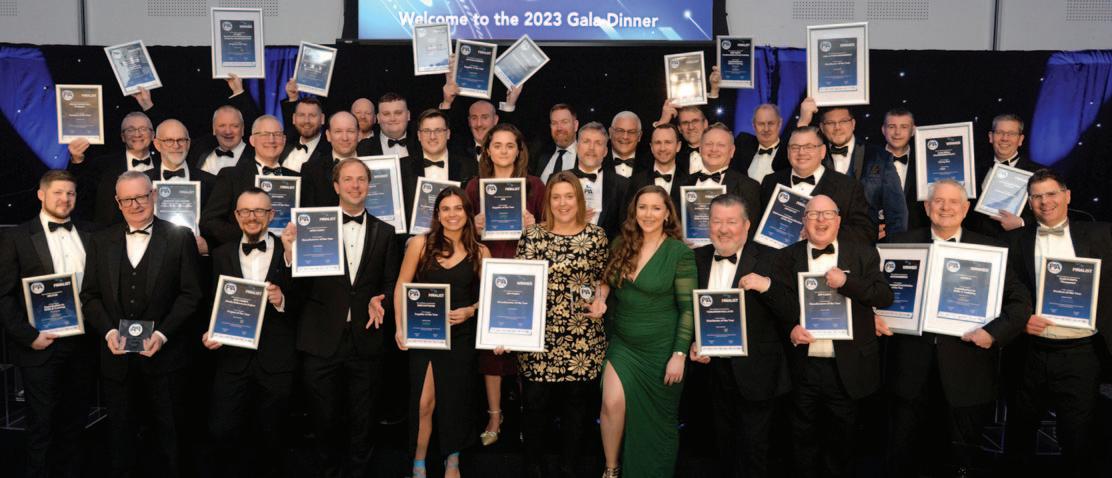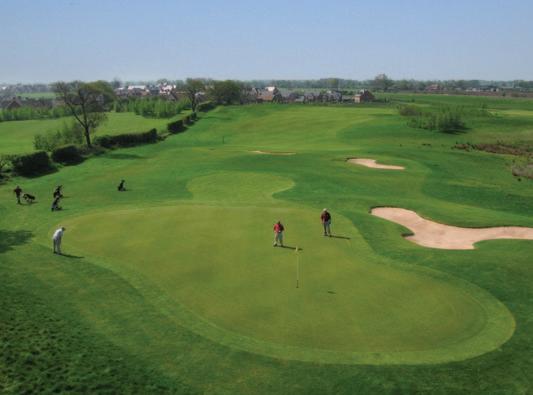
13 minute read
Pump sector recognises excellence once more
Following the success of previous events, the 2023 Pump Industry Awards presentation evening was held on 16th March at the famous St George’s Park in Staffordshire –the Home of English Football.
Credited as being another huge success by all those in attendance, the event once again celebrated business and professional excellence right across the pump industry. In keeping with the chosen venue, football icon Kevin Keegan OBE provided the after-dinner entertainment before helping to conduct the main awards ceremony. The entire event reflected the resurgent enthusiasm for live ‘in-person’ events and provided a wonderful opportunity for pump people to once again unite and connect with friends, colleagues, and clients.
David Binge, Commercial Manager, World Pumps Magazine, summed up the feeling of all by saying: “Thank you for another great night celebrating the hard work and achievements of the pump industry. The awards give us the perfect opportunity to catch up with industry friends and make new connections. As ever, it was a pleasure to sponsor and present the Rising Star Award, and we look forward to coming back next year.”
Long standing supporter, Colin Simpson, Business Development Director, Tomlinson Hall, commented: “It’s always a pleasure to be part of such a fantastic evening, and this year’s event will rank as one of my personal favourites. The atmosphere created by the venue was fantastic and to have Kevin Keegan as the guest speaker was inspired.”
That sentiment was further echoed by Bob Tichband, Chief Operating Officer, SPP Pumps, who said: “We are a proud member of the BPMA and appreciate the support it gives to UK pump manufacturers and associated companies. We were honoured to win the coveted ‘Manufacturer of the Year’ award and our team enjoyed a fantastic night celebrating this success at the excellent awards dinner. We were also very pleased to sponsor the Environmental Contribution of the Year Award, of which AES Engineering were worthy winners.”
Event Director, Andrew Castle, said after the event: “Selecting a new venue for an established event is always challenging, but the Hilton at St George’s Park served us extremely well, and allowed us to bring a number of other developments into play for the evening.”
Recognising significant achievements which took place in the period up to December 2022, the eight category winners were revealed, and are shown in the next column.
Product of the Year Sponsored by Process Engineering: ARO – EVO Series Electric Diaphragm Pump
Project of the Year Sponsored by Stuart Turner: Sulzer – Retrofit of five membrane feed pumps for a desalination plant
Environmental Contribution of the Year Sponsored by SPP Pumps: AES Engineering
Manufacturer of the Year Sponsored by WEG UK: SPP Pumps
Distributor of the Year Sponsored by Stuart Turner: Seal & Pump Engineering
Supplier of the Year Sponsored by Wilo: WEG
Contribution to Skills & Training Sponsored by Crest Pumps: AESSEAL
Rising Star Award Sponsored by World Pumps: Lewis Wilkes – Salamander Pumps
Special Recognition
After some 48 years spent in the pump industry, with a little under half of that time working for the sector’s trade body, Steve Schofield, CEO of the BPMA, is now enjoying a wellearned retirement. As such, the BPMA Board and Council could not let the event pass without saying a public and heartfelt thank you to Steve, for all the hard work and dedication he has given to the association. Steve was presented with a number of gifts which he takes with him to retirement.
Charitable Donation
WaterAid is the chosen charity for his event, and in keeping with previous events a game of ‘heads or tails’ was conducted with the lucky winner receiving a selection of great prizes. A total of £1820.00 was raised on the night for WaterAid.
2024 Awards Programme
With advancing technology a constant entity across the sector, we are already seeking nominations and entries for the 2024 Pump Industry Awards. The gala dinner and presentation will again take place at St George’s Park on Thursday 14 March. ■
For further information on any aspect of the awards programme, please contact Event Director, Andrew Castle on 07785 290034 or by email at andrew@touchwavemedia.co.uk
This year’s BPMA Golf Day is set to take place at the prestigious Wychwood Park known for being one of the top inland courses in the north of England. The course is a European PGA TOUR standard with 7,213 yards of Championship tees, offering a challenging experience for golfers.

Located in the picturesque countryside of Cheshire, players can enjoy stunning views while tackling the 18hole par-72 course, complete with US PGA-specification greens, splendid fairways, challenging water hazards, and protected wildlife areas.
For those who have attended BPMA Golf days in the past, this year’s event promises to be just as amazing, whether it’s a team-building exercise or an opportunity to reward staff or entertain clients. It’s a date worth marking in your diaries.

There are still available spots for those who would like to enter a team. See Booking Form overleaf.
Golf Day 2022
The Welsh National golf course at the beautiful Vale Resort in Glamorgan, presented a challenge for our teams this year. With fewer sand traps than some courses, shot management proved to be the decisive factor, as players negotiated unforgiving fairways, water hazards, and natural obstacles.

This year, the popular Texas Scramble Format underwent a slight amendment, which resulted in some close scores and surprising outcomes. Each team had to declare 4 tee shots used by each player, instead of 3. This change meant that only 2 spare tee shots were available to each team, compared to 6 in previous years. Interestingly, this small alteration contributed to a more cohesive team experience with less dependence on any particular player.
The day started with Steve Schofield delivering the team talk over tea, coffee, and bacon rolls. Afterwards, the players collected their buggies, which were equipped with sat nav and a course map. Team photos were taken on the first tee, and a video of the event by Steve Ashman of Ashman Media can be viewed on the BPMA website. Despite the 18mph wind that added to the challenge, the day turned into a sunny one.
In the evening, over a delicious meal, stories of the day were shared, and Steve Schofield thanked the event’s sponsors before announcing the results.
Bpma Golf Day
7th September 2023
18 Holes of Championship Golf
Special prizes: Longest drive Nearest the Pin
WYCHWOOD PARK HOTEL & GOLF

Wychwood Park, Crewe, Cheshire CW2 5GP
The Course
Widely regarded as one of the premier inland courses in the north of England, Wychwood Park is a European PGA TOURstandard course. Its 7,213 yards of Championship tees provide the ultimate challenge for golfers, while its location in the rolling countryside of Cheshire offers spectacular views.
The 18hole par72 golf course is comprised of US PGAspecification greens, magnificent fairways, testing water hazards, and protected wildlife areas.

Anyone who has attended a BPMA Golf day knows to expect a fantastic experience whether as a team building exercise or a way to reward staff or entertain clients, definitely a date for your diaries.
I/We would like to reserve places for the 2023 BPMA Golf Day package . . . . . . . . .
Include B&B accommodation on 7th September for . . . . . . . . . . . . . . . . . . .
@ £95.00
@ £105.00
B&B accommodation for the night before the event (6th September) at £105.00 is available but must be booked directly with the Hotel
Contact Company
Email Contact Steve Smith on 0121 601 6691 or Email s.smith@bpma.org.uk
Included are: Buggies
3 Course Prize Giving Dinner
Overnight
Accormnodation
Breakfast on departure and more
A Team consists of 4 players and you can enter more than one team Teams of less than 4 players can be accommodated Sponorship Opportunities are available BPMA
47 Birmingham Road West Bromwich B70 6PY
European Directives
Machinery Regulation (MR)
The provisional agreement on the Machinery Regulation, struck by the co-legislators on 15 December 2022, was formally adopted by the Committee of Permanent Representatives (COREPER) in the Council on 25 January, as well as by the European Parliament’s Internal Market Committee (IMCO) on 2 March.
In terms of next steps, the adoption of the final text in the Parliament plenary is foreseen to take place on 17 April, after which the Competitiveness (COMPET) Council is expected to formally endorse the regulation, which will pave the way towards its publication in the EU Official Journal.
Construction Products Regulation (CPR)
On 23 January 2023, a debate in the Internal Market Committee (IMCO) of the European Parliament was carried out to discuss the amendments tabled on the revision of the CPR. The IMCO rapporteur, Christian Doleschal (EPP, Germany) announced that 660 amendments (514 – 733 and 734 – 954) had been tabled to his draft report. Although there is consensus on the scope of the regulation, the issue of whether or not direct installation of construction products should be covered by the CPR remains open. The rapporteur proposed deleting direct installation from the scope of the CPR as well as excluding 3D-printed construction products. Several amendments also highlighted the introduction of a product passport for construction products, and what information should be included in this digital format. Other amendments submitted concern procedural matters, notably the question of what would happen if a standard did not comply with the underlying standardisation request or the legal framework and could therefore not be included by the Commission in the EU Official Journal. The rapporteur believes that the focus should be on resolving the current standardisation backlog to ensure that products which are essential for constructions are not omitted.
The next IMCO meeting to debate compromise amendments is currently scheduled for 24 April, to be followed by the IMCO vote on 23 May. The date of the plenary vote has not yet been announced, but it is expected to take place in June or July.
As far as the Council discussions are concerned, the Working Party on Technical Harmonisation (Construction Products) has held four meetings since January 2023, making progress on the examination of the Swedish Presidency’s compromise proposal, notably with regard to the following issues: direct installation, mandatory standards (Article 4) and transitional structure (Articles 92-93).
Alongside the legislative process on the revision of the CPR, parallel discussions are continuing regarding the CPR Technical Acquis. The European Commission expert group on the CPR Technical Acquis Process Steering Group met in February 2023 to review the work carried out by the first two product families going through the process, namely precast normal/lightweight/autoclaved aerated concrete products and structural metallic products and ancillaries. In addition to these product groups, a horizontal thematic subgroup dealing with environmental sustainability was launched in the last quarter of 2022. The next product families will start the process before the summer and a fast-track system might be launched for those further down the priority list.
Critical raw materials
On 16 March, the European Commission adopted the European Critical Raw Materials Act (ECRMA). This initiative comprises a Regulation and a Communication. The Regulation sets a regulatory framework to support the development of domestic capacities and strengthen sustainability and circularity of the critical raw material supply chains in the EU. The
Communication proposes measures to support the diversification of supply chains through new international mutually supportive partnerships. The focus is also on maximising the contribution of EU trade agreements, in full complementarity with the Global Gateway strategy.
2030 Digital Compass
On 23 February, the European Commission unveiled a series of measures with the goal of achieving widespread Gigabit connectivity across the EU by 2023, as part of Europe's Digital Decade plan. These initiatives aim to transform the connectivity sector within the EU and ensure that both citizens and businesses have access to high-speed internet.
The initiatives on connectivity consist of:
• A proposal for a ‘Gigabit Infrastructure Act’, a regulation that will introduce new rules to facilitate faster and more affordable Gigabit network deployment throughout the EU.
• A draft Gigabit recommendation, to advise National Regulatory Authorities on the terms of access to telecom networks for operators with significant market power.
• An exploratory consultation on the future of the connectivity sector and its infrastructure, which will be carried out to gather feedback on how future technological advancements and increasing connectivity demands may impact the sector's development and infrastructure needs. The consultation will close on 19 May 2023.
Artificial Intelligence
The work on the Artificial Intelligence Act (AI Act) is progressing in the Parliament, while the Council already agreed on its general approach in December 2022.
In the European Parliament, all the Committees for opinion (JURI on legal affairs, ITRE on industry, research and energy, CULT on culture and education, TRAN on transport and tourism, ENVI on environment, public health and safety) published their reports.
IMCO-LIBE (Committees responsible on internal market and consumer protection and on civil liberties, justice, and home affairs) have so far published twelve batches of Compromise Amendments (CAMs):
• Batch 1: Chapter 4 (notifying authorities and notified bodies), covering Articles 29a-39a
• Batch 2: Chapter 5 (standards, conformity assessment, certificates, registration), covering Articles 40-51
• Batch 3: Chapter 3 (obligations of providers and users of high-risk AI systems and other parties), covering Articles 16-29
• Batch 4: Focuses on the topic of sandboxes, covering Articles 53, 54 and Annex IXa
• Batch 5: Chapter 2 (requirements for high-risk AI systems), covering Articles 8-12, and Annex IV
• Batch 6: Articles 1-2a (subject matter and scope)
• Batch 7: Title X (confidentiality and penalties), covering Articles 70-85
• Batch 8: Articles 56-59a (AI Board)
• Batch 9: Articles 60-68 (EU database, post market monitoring, reporting of incidents, enforcement) new
• Batch 10: Articles 6-7 (classification rules for high-risk AI systems) new
• Batch 11: Article 5 (prohibited AI practices) new
• Batch 12: Article 3 + Annexes II & III (definition of ‘AI system’ and classification of high-risk AI systems) new
Next steps: The vote in the IMCO-LIBE Committee might take place in Q1-Q2 2023, while the vote in plenary might occur in spring 2023. Although there is currently no fixed date, trilogues might start in April 2023. However, further delays are likely to occur, mainly because of heated discussions still taking place surrounding the definition of ‘AI system’ and the inclusion of AI text generators.
Artificial Intelligence Liability Directive
In the European Parliament and Council, work on the Commission proposal for an Artificial Intelligence Liability Directive (AILD) continues.
The draft report of JURI, the Committee responsible on the AILD, is expected to be published on 30 May. The consideration of the draft report will take place on 3 July, and the deadline for amendments is, for the moment, set for 14 July. The vote in JURI is currently planned for 7 December, and the vote in plenary is expected to take place in mid-December.
Chips Act
The work on the Chips Act is progressing in the European Parliament and EU Council.
Cybersecurity
The work of the European institutions on the Cyber Resilience Act (CRA) is progressing.
In the Parliament, discussions are still taking place regarding the lead on the file. While the ITRE Committee has already been appointed as the Committee responsible, IMCO is still currently fighting for co-responsibility. Meanwhile, the LIBE Committee remains the Committee appointed for opinion.
The ITRE Committee aims at publishing its draft report by the end of March, but because of the delays caused by the conflict of competences between the ITRE and IMCO Committee, this might be postponed. If the ITRE draft report is published by the end of March the vote in plenary might occur in June or July, so that, based on a timely general approach from the Council, trilogues could start after the summer.
In the Council, the Swedish Presidency published its first compromise proposal in February. It was published in two different parts: part 1 (covering Article 5, 10-17 and Annexes I & II) and part 2 (covering Article 6, 18-24 and Annex III).
Main changes :
• Article 6 (critical products with digital elements and highly critical products with digital elements): a few changes are introduced on the explanations concerning which categories of products belong to criticality class I and class II
• Article 10 (obligations of manufacturers): a few changes are introduced. For example, manufacturers shall determine the period of time after the placing on the market of a product, during which they shall ensure that the vulnerabilities of that product are handled effectively. For products with digital elements which have a lifetime of more than five years, this shall not be less than five years.
• Article 11 (reporting obligations of manufacturers): it introduces the designation of coordinators (CSIRT) for the purpose of coordinated vulnerability disclosure of Member States, to take place through a single reporting platform. The coordinators should be the ones to report to ENISA (the EU Agency for Cybersecurity)
• Annexes (cybersecurity requirements and classes and categories of critical products): many changes were introduced using different terms in an attempt to reduce legal uncertainty
In the Council, a telecommunications meeting is planned for
2 June, during which either a general approach or a progress report will be presented.
Data Act
The Parliament and Council’s work on the Data Act is progressing.
European Parliament
On 14 March, the European Parliament adopted in plenary their agreed text on the Data Act, paving the way for interinstitutional negotiations. The first political meeting is already scheduled for 28 March.
Main points
• Scope: according to the Parliament text, the data under the scope refers to the non-personal data the IoT products have collected. This excludes any data resulting from the processing and inferring of algorithms.
• Business-to-business (B2B): the Parliament text specifies that companies cannot use the data they receive to develop a competing product, but they can employ it to inform an alternative service. Additionally, in B2B, the data holder can request compensation. If the receiving company is a small or medium enterprise, the compensation cannot exceed the technical costs of making the data available.
• Trade secrets: a few caveats were introduced on trade secrets, such as data undermining the safety of a product. Also, data recipients will be liable for the damages caused to the data holder for any unlawful disclosure.
• International data transfers: the Parliament amended the prevention of cloud services from sharing non-personal data with the authorities of a third country, to require cloud providers to locate their data infrastructure within the EU.
• Unfair contractual terms: the Parliament extended the prohibition of unfair contractual terms to all companies, as opposed to the Commission proposal, which only protected small and medium enterprises.
European Council
On 8 March, the Swedish presidency published the sixth compromise text on the Data Act.
Main changes
• Scope: in the previous compromise, the Swedish presidency proposed excluding from the scope all data subject to Intellectual Property (IP) rights or specific knowhow of the data holder. In the latest text, the reference to ‘specific know-how’ was removed, to reduce legal uncertainty.
• Trade secrets: the scope of exceptional refusal of the data holder to share data, which was introduced in the previous compromise, is now broadened from unlawful misuse or disclosure of information covered by IP rights to any trade secret. The data holder would have to duly substantiate the reasoning for its denial and inform the competent national authority.
• Data protection: new wording clarifies that whenever users obtain personal data that is not theirs, the Data Act does not provide the legal basis for processing it.
As for the next steps, if the Member States can manage to agree on their position in good time, a first trilogue meeting could take place on 28 March.
General Product Safety Regulation (GPSR)
On 21 January 2023, the Committee of Permanent Representatives (COREPER) in the Council endorsed the final compromise agreement resulting from the trilogue negotiations which were concluded on 28 November 2022.







